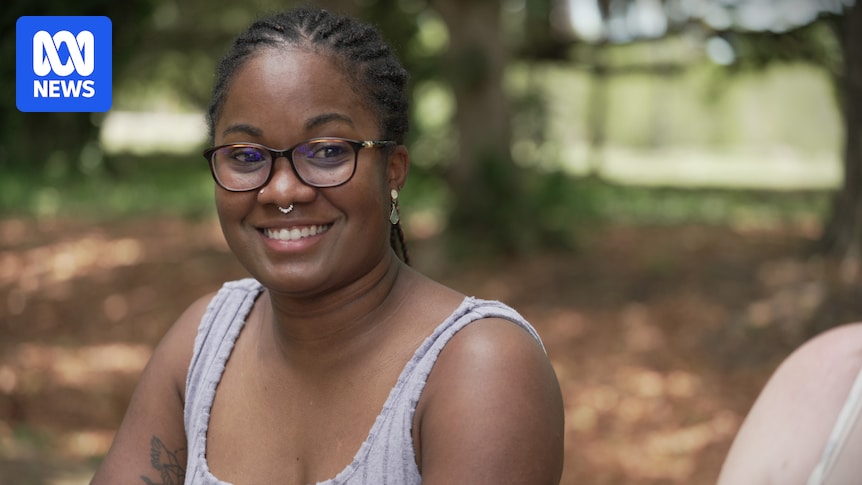A diagnosis of multiple sclerosis can take a previously energetic young person by complete surprise — that’s what happened to Shaquila Ah-Wong two years ago, while still in her 20s.
One of Ms Ah-Wong’s sisters noticed she was having trouble walking and a short time later she was in a hospital bed, unable to feel her body from the neck down.
“It was so drastic, I had to learn how to walk, how to use my hands, how to do everything pretty much again,” Ms Ah-Wong said.
In the face of dwindling support for multiple sclerosis (MS) in the Northern Territory, Ms Ah-Wong and several other women have been running a local support group to fill the gap.
A group of Darwin women who have been diagnosed with MS meet up regularly to offer each other support. (ABC News: Felicity James)
“It’s been a safe space for people to communicate what they’re going through as well as trying to meet new people,” Ms Ah-Wong said.
“I’ve learnt so much from the other girls, to see what actual supports we can get within Darwin.”
Professional help to navigate the difficult period just after diagnosis can be life-changing.
The MS Society SA and NT, which has provided access to specialised nurses over the phone, recently entered voluntary administration, citing a range of financial pressures.
It is still unclear what this will mean for around 90 Territorians with MS and their families, who have relied on the organisation for support.
“I do hope that they can offer us services in the future because Darwin is isolating in itself and there’s not so much assistance here when it comes to MS nurses,” Ms Ah-Wong said.
When Sarah Skopellos received her diagnosis more than a decade ago, a nurse from the MS Society was physically located in Darwin.
“They were amazing, they came to my house, made me cups of tea, gave me advice, kind of counselled me through that whole grieving process that comes with a diagnosis like that,” Ms Skopellos said.
“At the time, I was partying hard like most 22-year-olds, spending all my money at the Vic (Hotel).
“Ten years later I’m using a walking frame, a few years after that I’m in the wheelchair.”
Sarah Skopellos says it was a shock to go from “partying hard” with her friends at the local pub to needing to use a wheelchair within 10 years. (ABC News: Felicity James)
MS is a degenerative disease that progressively damages nerves, making it increasingly difficult for the brain and the body to communicate.
Its symptoms are varied, often invisible and are mostly discovered between the ages of 20 and 40.
“Anything from bladder control to vision problems, to walking difficulties, pretty much anything in your body that could go wrong, could go wrong with MS,” Ms Skopellos said.
“There’s really no-one in Darwin who is interested in talking about that, except for other people with MS.”
An isolating experience
Kelly McRae says over-the-phone consults with a wellbeing nurse were a big help to her. (ABC News: Felicity James)
After Kelly McRae’s recent diagnosis, grief also hit hard but MS nurses reached out over the phone.
“A wellbeing nurse, who really helped me through that grief initially, helped me think about how I can explain this to my husband and to my kids,” Ms McRae said.
“You can feel so alone and trapped in a body that doesn’t want to work.”
Michelle Gordon says she became depressed after her recent diagnosis but the support group and MS nurse helped her feel less alone. (ABC News: Felicity James)
Michelle Gordon is one of the newest support group members, having received her diagnosis last November.
“In about February this year I went into a huge depression, like ‘that’s it, my life’s over’,” Ms Gordon said.
“Then I met these ladies and realised I’m not alone.
“Julie, my MS nurse, has been wonderful. I can email her anytime and she’ll get back in two hours.”
The local support group has been a lifeline for residents wanting to form connections with others living with MS.
“Even if you don’t have the words to be able to describe what you’re feeling, they just get it,” Ms McRae said.
Darwin’s MS support group members enjoy speaking to others with lived experience of the disease. (ABC News: Felicity James)
However, the group depends on volunteers.
“We’re talking about people who already live quite complicated lives,” Ms Skopellos said.
“The sustainability of the group is a real risk.
“If this group did not exist, there would be nothing for people with MS in Darwin.”
Shaquila Ah-Wong says she wants to see more on-the-ground support for people with MS in the Northern Territory. (ABC News: Felicity James)
The group has reached out to the Northern Territory government for support, with one member requesting funding for a specialist nurse with expertise in neurological conditions.
While they await a response, Heard Phillips Lieberenz — the administrators overseeing the MS Society SA and NT’s finances — have told the ABC existing services will be maintained while they find a buyer for the organisation.

